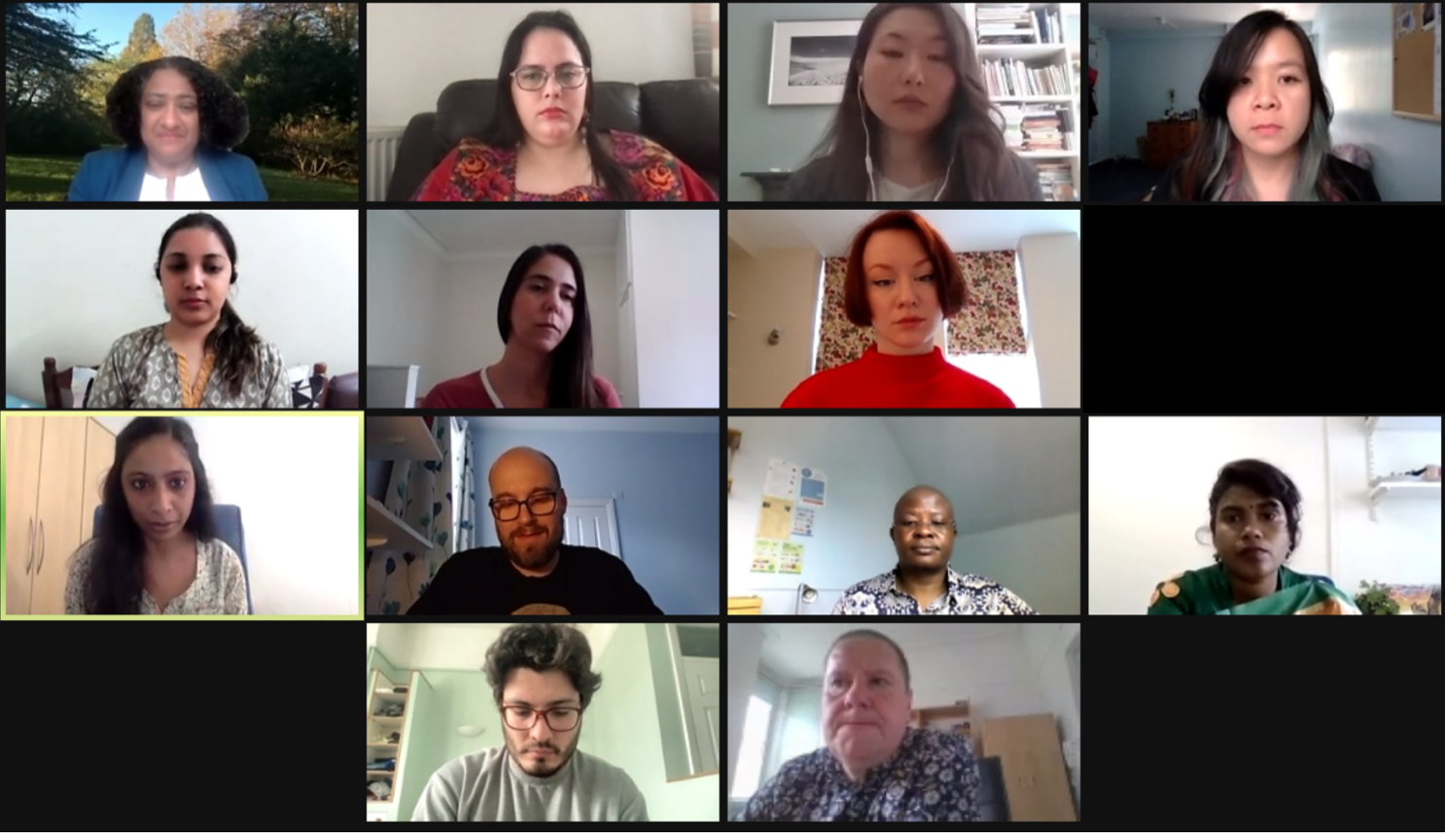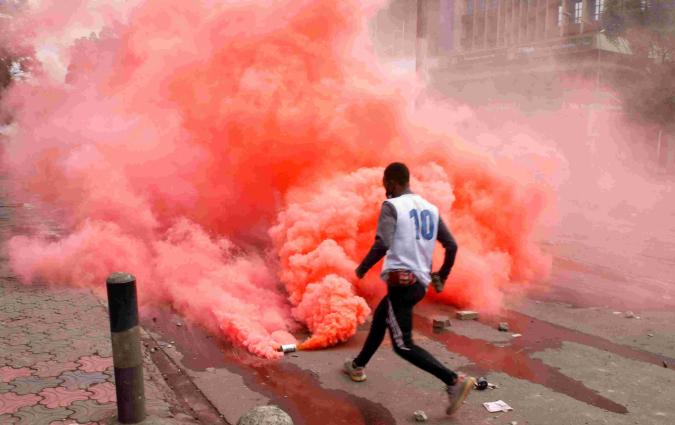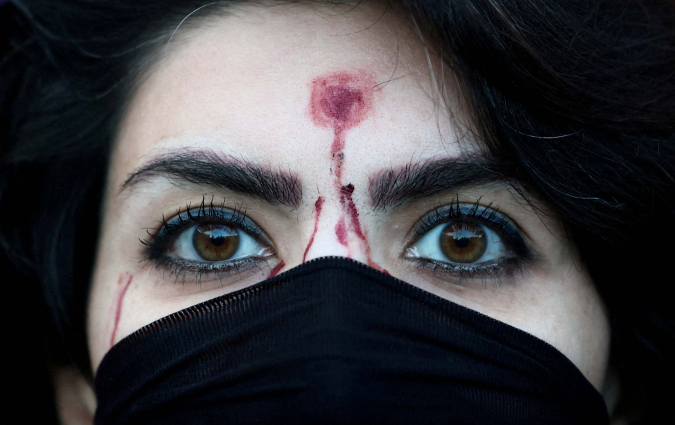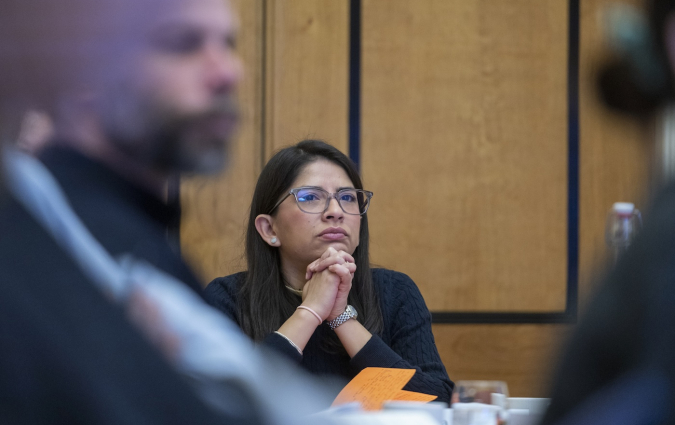13 lessons from our Journalist Fellows on the future of journalism worldwide

Our Journalist Fellows share their experiences at an event which was part of our global journalism seminar series.
In January 2021, a truly determined group of journalists from Kyrgyzstan, India, Hungary, Norway, Finland, Indonesia, Pakistan, Kenya, Nicaragua, and Brazil moved to Oxford to join the journalism fellowship programme.
With no chance of meeting in person, the fellows forged ahead with an itinerary of online seminars and social meetings. “We carried on with the fellowship online despite lockdown, speaking about the future of journalism and the challenges facing the news industry,” said Meera Selva, Director of the Journalism Fellowship. “It is vital to have these conversations – now, more than ever.”
Against all the odds, our Journalist Fellows still managed to make meaningful relationships and expand their thinking about journalism. Here are the key takeaways from the term they spent in lockdown. You can also watch the full video of the seminar below.
1. Amazing innovation is happening in our industry – but it’s not always in the places you’d expect to find it
Peter Erdelyi, senior editor and director at 444.hu in Hungary, arrived in Oxford on January 4, 2021 – just in time to hear Boris Johnson announce that England would be returning to national lockdown. “There are very few places in the world where you can be mostly stuck in your room and still have your horizons radically broadened,” he said at our event.
Erdelyi, whose project will investigate audience revenue models, has found new sources of inspiration. “Most of the research around the media business focuses on North America and Western Europe and on how new funding models may impact the state of democracy,” he said. “I'm looking at the same dilemma, but from a different perspective: how does a challenging political environment influence the business models of media outlets?”
In speaking with outlets in Central and Eastern Europe, Central and South America, Asia, and Africa, he has found that they face similar challenges. He has also found some exciting answers. “While we often look at giants like the New York Times or the Guardian for inspiration, I keep finding innovation in places where coming up with smart and efficient solutions is not a choice but an absolute necessity.”
2. Journalists are part of a global family and we face many of the same struggles – we can learn from each other
Rachel Chitra is a financial journalist from India who has spent the past 15 years working for outlets like Reuters and the Times of India. “For the first decade of my career, I was free to report truthfully and sometimes critically about the failures of the establishment,” Chitra said. “Since 2014, under current Prime Minister Narendra Modi, I have seen a shift in this freedom.”
She is not the first to note this shift: The Free Speech Collective found that 154 journalists arrested in the last decade, 40% of those in 2020 alone. Internet shutdowns are frequent, and those who persist in reporting unfavourable narratives face dire consequences. Chitra mentions Siddique Kappan, arrested by the Uttar Pradesh police on October 5 for "conspiring against the state government." His crime? He went to interview the family of a Dalit girl who had been raped.
“What I learnt in Hilary Term is that [...] we are not alone in India,” she said. “Listening to Zimbabwean journalist Hopewell Chin'ono speak to us soon after his arrest and detention or to my Pakistani colleague Ramisha Ali about journalists facing arrest and detention in Pakistan... has made me realise we aren't alone in this, and we should continue our mission to bring people the best possible information."
“There are journalists worldwide taking on corruption, excesses and powerful people, from governments to mafias. Together we are facing job losses, arrests, detentions and sometimes death. It has been powerful and empowering to realise I am part of something bigger than my state or my country’s problems,” Rachel said.
3. The borders of press freedom are shaped by the business of news
Ipsita Chakravarty, an editor at Scroll.In, said she was focused on the editorial side of journalism before coming to Oxford and paid very little attention to the business of news, the levers that control it, how it is spread, how it is read, who reads it and how fact-checked, independent journalism may be sustained.
“That is something we've talked about a lot this term. Quite frankly, I thought it had little to do with my interests at first. But now I find it has deepened my understanding of journalism and of what we are fighting to protect," she said.
4. Tech companies are capable of fighting misinformation on their platforms. Will they take action globally?
Discussions of new moves by tech companies in the US caught the attention of Bermet Talant, a journalist from Kyrgyzstan who has been working in Ukraine for several years.
In response to the political events of January 2021, companies like Twitter and Google took swift action to moderate their platforms and services. Discussions among fellows, and with representatives of tech companies, came back to the same question: where was this same motivated action when others were asking for it?
“Rumours spread on Facebook and WhatsApp incited violence and murders in India and Myanmar,” said Talant. “Troll armies targeted journalists in Azerbaijan and the Philippines. A viral fake messaging campaign on WhatsApp helped Jair Bolsonaro win Brazilian presidency. And Ukraine, where I worked for over four years, has been fighting Russian state propaganda on a parallel track with the real war in the Donbas [region]. And yet calls for action from citizens in those countries went unnoticed, as if the skewed elections and mob violence were results of our dysfunctional states or polarised societies only, and not [the result of the lack of] tech companies’ oversight.”
5. Technology and graphic design present opportunities for us to do a better job as journalists
Malva Izquierdo from Nicaragua works as a Digital Content Editor for an online platform called Managua Furiosa, which covers sexual and reproductive rights and gender equality.
“Technology may pose challenges, but it also changes the way we do and present our journalism,” said Izquierdo. “Consider the news-gathering and disseminating work happening at TikTok or my fellow Christine’s work at Glance in Indonesia to deliver news on our lock screens. Or the many online tools that help journalists to locate, verify and report accurate information. Or this example from El Pais and their infographics team, who used moving visual diagrams to tell a story about the virus in a way that could be easily understood by many. We often talk about the challenges of the changing world to journalism. It’s been encouraging to see how some of these changes are helping us do a better job.”
6. Threats of echo chambers and filter bubbles have been vastly overstated – this has challenged my assumptions about the role of journalism in society
Christine Franciska, from Glance in Indonesia, spent time immersed in the latest research findings.
“What surprised me the most is what the studies say about the connection between news diet, echo chambers, filter bubbles and polarisation,” she said. “For years, I personally thought that media echo chambers and filter bubbles were some of the pressing issues faced by the newsroom nowadays, but if these assumptions are overstated, what does this mean for newsrooms and their strategies?“
7. Lack of diversity in newsrooms breeds discontent in our audiences – so is diversity the route to winning back readers?
Mark Oloo, an editor at The Standard in Kenya, was struck by conversations about diversity and race in newsrooms, particularly through the lens of ethnic minority representation in Kenyan newsrooms.
“My lesson one is that lack of diversity simply leads to no diverse content, no diverse voices, no diverse thoughts and no diverse audience. My lesson two on this subject is that diversity leads to collective objectivity in a newsroom, ”he said.
Oloo believes legacy media in Kenya may be able to win back audiences by focusing on this issue. “Women, the younger generations, minority and other marginalised groups deserve greater inclusion,” he said.
8. Diversity is a deep and multi-layered value for journalists to pursue – even in a largely homogenous society
Jenni Kangasniemi, a lifestyle editor from Helsingin Sanomat in Finland, was prompted to think about diversity from more than the gender balance angle.
“I’m specialised in health content, and one of the areas where lack of diversity is obvious is mental health reporting,” Kangasniemi said. “The covid pandemic has highlighted this problem as we are now also facing a global mental health crisis. There is more domestic abuse, more depression and more school dropouts than in a very long time, and we are yet to face the consequences.”
Too often, she said, coverage of this issue focuses on stories of those who seek help, receive it, and overcome their troubles.
“The truth is, mental health often isn’t cathartic. We need more stories about people who relapse, wait for years to get treatment, get sent from clinic to clinic and maybe never get better because one of the purposes of journalism is to make the people who disappear between the lines visible again," she said. “I know these stories aren’t easy to tell or sell but they are crucial in order to understand society and the human psyche.”
9. Even in progressive countries, there is so much more journalism can do to promote a welcoming and inclusive society
Tor Kjetil Kristoffersen is a news editor at a local newspaper in Finnmark, in the north of Norway. His country, he said, is often held up as a model of progression and social cohesion. Conversations with his fellows made him realise there was much work still be done.
“There's also a lot of racism in Norway,” he said. “I was moved by Shazia Majid’s talk, a Norwegian journalist in Norway's most prominent newspaper, VG. Shazia is of Pakistani origin, and shared her experience of facing threats and hatred not only as a woman but as a Muslim person of immigrant background. Being half-Sámi myself, I could relate to her sentiments about ignorance of ethnic minorities in our country. Even in countries that seem to be doing well, we have work to do to make sure our societies are more inclusive and welcoming of differences.”
10. Environmental journalists can do a better job when they collaborate and support each other
Adele Santelli, an environmental journalist from Brazil, said an important lesson she took from Hilary term is the value of collaboration.
“I've learned the importance of having a network of support and exchanging experiences with other journalists from different countries as a powerful tool to fight against attacks and promote a safer working environment,” she said. “Talking to other journalists about what's happening in your country, and listening to them, can make it easier to find a solution. Working together is also important to rebuild trust and to improve journalism practices.”
11. More than 120 countries have passed Freedom of Information Acts, but most journalists are not making best use of these laws
Luiz Fernando Toledo, one of the directors of the Brazilian Association of Investigative Journalism, has found that many fellows face similar challenges when it comes to making best use of Freedom of Information Acts (FOIA). “Today more than 130 countries have some kind of FOIA," he said. "In Brazil, although our FOIA is almost 10 years old, only half of the journalists have used it at least once, according to a national survey we have made this year.”
12. We are taught to report the news and not to become it, but sometimes journalists’ stories need to be heard too
A journalist in exile said she has always been passionate about telling human stories. During her time at the institute, she has been listening to the stories of journalists.
“These exiled journalists were the ones who gave voice to the news of the day,” she said. “But what happens when you are the news? We also need to be reported on, for each of us has a hidden story. There are many journalists in exile who carry these personal stories like heavy stones.”
13. Journalism, much like this fellowship, is what you make of it
Ramisha Ali, a journalist from Pakistan, said she had learned that journalism, much like this fellowship, is what you make of it.
“Just as we fellows attend the same sessions and seminars and take vastly different lessons away, so too can journalists attend the same press conferences, protests or tragedies, and come away with vastly different understanding,” she said. “What you get out of this trade depends on how you engage with people.”






